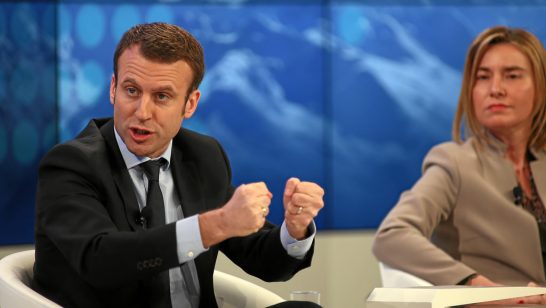
Sixty years ago, in Rome, France stood side by side with its neighbours to establish the European Economic Community in what was one of the most significant steps forward for the European project. Sixty years later, France is playing host to what many believe to be an existential vote on the European Union, causing understandable anxiety amongst other member states.
After the first round of voting on 23rd April, Emmanuel Macron and Marine Le Pen are heading to the final run-off, which will be held on 7th May. The significance of this should not be understated: a far-right candidate has made it to the final round, the ruling Socialist Party has collapsed and, for the first time in the history of the Fifth Republic, there will be no mainstream right-wing candidate in the second round.
French voters will decide between two clashing visions of France and of Europe. Europeans are correct to worry about a Le Pen presidency, and are perhaps also right to be optimistic about Emmanuel Macron. But some commentators are wrong to overstate either candidate’s ability to immediately implement their visions should they emerge victorious in the second round. It is very unlikely that either Macron or Le Pen will have control of Parliament, meaning that onlookers’ anxiety will continue after the presidential election.
The French election cycle comes with a second hurdle: on 11th and 18th June, all 577 seats to the National Assembly will be contested in a two-round election. The result of this legislative election, although less glamourous and clear-cut from the outside, will decide whether or not the symbolic choice in May can deliver any major reform.
Both candidates promise to “revolutionise” French politics but, even in a political system dominated by an executive President, one needs to win control over Parliament to pass reforms and govern effectively. Although the newly-elected president is usually fairly sure to secure a parliamentary majority, events could play out differently in June. On 23rd April French voters de facto rejected the two mainstream parties which means that, no matter who gets elected president, they almost certainly won’t be backed by an already-established parliamentary majority in the lower house. While 289 MPs are needed for a majority, Le Pen’s Front National currently has two sitting parliamentarians and Macron’s En Marche! has none.
Before the votes in June, Le Pen would most likely approach independent nationalist candidates as well as the right wing of Les Républicains. But even with them on board, winning a parliamentary majority would be near impossible. On top of having a very limited number of MPs and almost no possible alliance with the mainstream parties, the anxiety over her election might lead voters to rush to the voting booth in order to limit her ability to govern. The Front National would likely come in third, after Les Républicains and the Socialist Party.
Although Macron has announced that En Marche! will present candidates in all 577 constituencies, he would most likely have to build a governing coalition as his one-year-old party has no realistic chance of winning 289 seats at once. To prepare for such a scenario, Macron has been meeting with Les Républicains MPs, as well as with liberal democrats from the Socialist Party who are already considering joining his presidential majority. Although he would be able to unite moderate MPs from both right and left into temporary majorities to pass specific bills, a stable parliamentary majority would still be hard to achieve.
The newly-elected president will thus most likely fail to obtain a majority in the lower house and may have to choose a prime minister (and cabinet) acceptable to the ruling majority in Parliament – although the lower house may then be too fragmented for a clear opposing majority to function. Such acohabitation scenario, which has occurred three times in the history of the Fifth Republic, means that the president’s powers are reduced and mainly focused on foreign and defence policies, while an opposing prime minister and cabinet are in charge of domestic affairs and can block presidential reforms.
The real question Europeans should pay attention to is thus not so much who will be elected president, but how they will run the country. A Le Pen presidency would realistically be a series of institutional crises and paralysis, from winning a parliamentary majority to forming a government and staffing the administration. She would most likely rule by presidential decree while trying to obtain a majority or end up dissolving the lower house. Macron, although not part of a mainstream party, would be able more easily to form a cross-party cabinet and attract civil servants, thus reaching a higher chance of “positive”cohabitation.
Why is it important for Europeans to keep these institutional considerations in mind? As some European politicians have already expressed their relief to the first-round victory of Macron, it will be imperative not to fall into the trap of simplified and emotional “doomed/saved EU” narratives on 7th May. Neither a Macron nor a Le Pen presidency will be a smooth ride and each will have a hard time delivering on their European promises.
Whoever gets elected will impact European security, with a choice between staying in NATO and drastically reducing France’s participation in the Alliance. But, most symbolically, the two candidates offer mutually exclusive projects for the European Union: whereas Le Pen wants a historic break from the EU, Macron believes in its essential existence and wishes to reform it.
A Macron victory would buy more time for the EU to try and reform but would not guarantee its success. The pro-EU liberal candidate, committed to the formation of a European Security Council and to maintaining open internal borders, will have to negotiate his programme with his parliamentary coalition. Moreover, to reform the union, Macron will need to deal with EU partners in the midst of a European-wide crisis of confidence.
Just as a Macron presidency cannot guarantee the EU’s salvation, a Le Pen victory would be a serious blow for the EU but would not immediately sign its death warrant. She would need to win the legislative election and, if it comes to pass, win the referendum on France leaving the EU that she wants to organise within six months or a year of her election. In the meantime, many factors could push French public opinion – which, although dissatisfied with the EU, still supports remaining part of the union – even further away from a “Frexit”: with whom and how she governs, whether she can pass reforms faced with a hostile Parliament, how the Brexit negotiations are developing, etc. If a referendum is conducted, a “remain” victory would constitute a huge blow to her project and presidency – she vows she would quit – and mark a strong defeat for Europhobes.
The presidential election result will have enough symbolic power to send shockwaves across the continent and, for many, redeem or condemn the 60-year-old European project France has helped to build. But looking at election night won’t suffice. Europeans should watch the French legislative election just as closely as the presidential one as the fate of France – and Europe – may still hang in the balance on 8th May.
The opinions articulated above represent the views of the author(s), and do not necessarily reflect the position of the European Leadership Network or any of its members. The ELN’s aim is to encourage debates that will help develop Europe’s capacity to address the pressing foreign, defence, and security challenges of our time.



